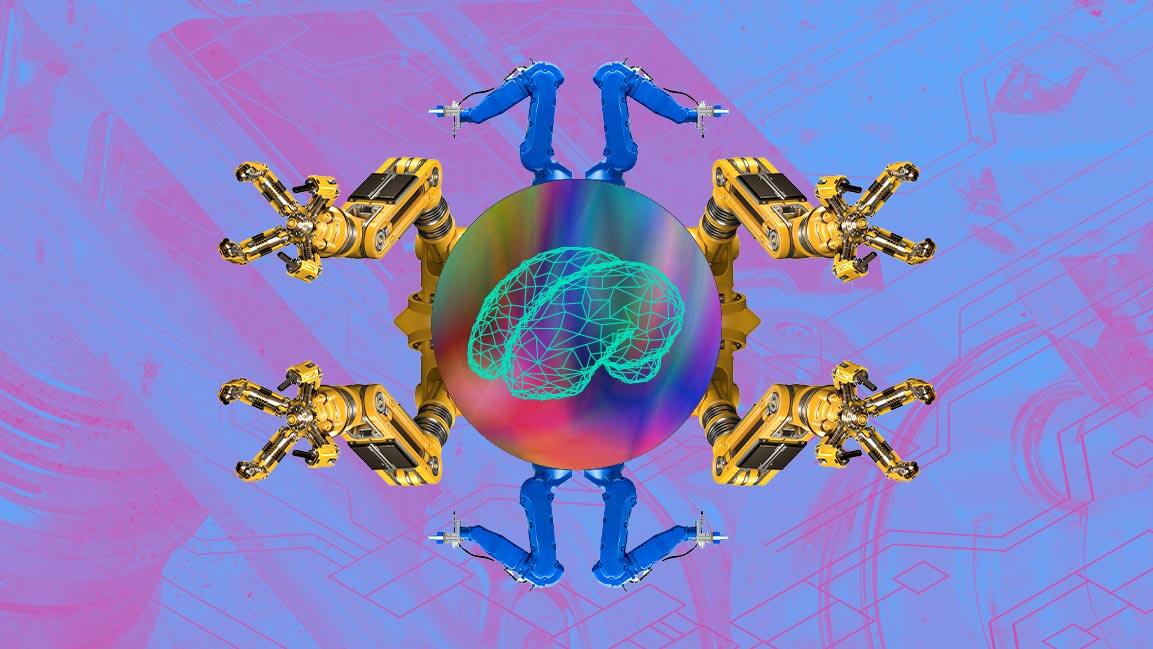- | 9:00 am
Robots guided by computer vision to transform manufacturing and retail in the Middle East
Collaborative robots can perform mundane tasks accurately and cut down workers’ idle time by 85%.

You just ordered the sneaker that just dopped and eagerly await for it to arrive the next day. Ever wondered what happens in between? What about those huge warehouses that store everything from furniture to automobile components and heavy electricals?
Servicing a rising number of online orders requires quick and efficient tech to sort and dispatch from warehouses, and robotic arms introduce automation to speed up this process. By stacking up goods finished with autonomous equipment, these AI-backed machines also improve the productivity and safety of employees at factories.
“Manual order picking is one of the most cost-intensive processes for most businesses, besides being dull and therefore bearing high risk for human error. Cobots (collaborative robots) equipped with computer vision systems can handle even mixed batches of products at the highest accuracy and efficiency,” says Navin Narayan, CEO of Acme Intralog, an industrial and warehouse automation company in Dubai.
UAE-based Reliable Robotics backs mobility platforms with robotic operating systems for autonomous navigation; its machines are enabled for 3D mapping via computer vision. Reliable has also designed the four-legged quadruped robot for precise inspections at NEOM.
As waiters, cops, and guides, robots may seem like a prop for a futuristic movie, but AI makes a real difference in customer care, healthcare, maintenance, and logistics. Robots saved lives by reducing human contact between patients and care workers during the pandemic. They have been speeding up back-end operations at retail stores in the UAE and neighboring countries.
Apart from these sectors, robots are expected to transform food production and delivery in the Middle East. Visitors to Expo 2020 in Dubai saw AI-guided robots delivering quick meals on wheels.
“The core robotics market is in food processing lines, frozen and ready-to-eat production lines, and specialty baked goods producers. We also see cobots in novelty areas such as coffee shops, ice cream vending machines, and electronics retail,” says Narayan, the CEO of Dubai-based warehouse automation firm, Acme Intralog.
The vision to automate manufacturing and logistics in the Middle East has also driven companies to launch vision-guided intelligent robots. Machine vision and deep learning are backed by 3D cameras, which allow droids to map the environment. Cobots speed up tasks such as bin picking, palletization, and sorting at warehouses and factories.
LEVERAGING ALGORITHMS TO INCREASE ACCURACY
So how do cobots fare compared to automated forklifts when it comes to managing products in storage and production?
Late last year, Dubai’s RoboStores introduced robots to automate stacking and packing at warehouses. Powered by Swisslog’s synchronized intelligence system, they bring precision and speed to the product picking. The firm’s AutoStore warehouse solution uses delivery robots to manage storage bins.
Robots guided by algorithms constantly evolving with data can meet the challenge of distinguishing between goods. Bin-picking is sorting different products from a container, which has been a problem for robotics.
Intelligent algorithms enable robots to quickly detect parts that can vary in sizes and shapes, accurately pick them, and stably place them. Cobots also come in handy for the woodworking industry as they can operate safely alongside humans and perform dull, repetitive tasks with utmost precision. Cobots are also being used to increase productivity in laboratory testing. These are easy to install and require little space to function alongside humans.
Going back to the role of cobots in the food industry, specialty grippers can be used to safely and hygienically pick and place any ingredients. This helps kitchens maintain consistency in the customer experience they are offering.
Another similar tech from Israel, Kitchen Robotics, has created a robotic kitchen that cooks one dish every minute. Users simply need to load ingredients in Beastro’s containers, providing 60 dishes an hour. The smart chef also takes care of complex procedures like sauteing vegetables.
AI-POWERED PRECISION BACKED BY SOPHISTICATED EQUIPMENT
Algorithms designed to identify products also need to be supported by equipment that can handle goods of different shapes and sizes.
ABB, a tech firm with a presence across the Middle East, has set up a test center to develop a 3D vision for automation. The facility will develop robots for performing bin-picking operations with higher accuracy.
As the demand for these services in the Middle East increases, with government initiatives promoting industry 4.0 solutions, more businesses will deploy affordable and flexible robotic automation onto their shop floor.
RISING DEMAND FROM EMERGING SECTORS
Ecommerce, food and beverage, and healthcare have experienced accelerated growth during the pandemic. These sectors also drive the demand for digitization to serve a consumer base expecting quick service. Managing online orders is the first step, but speeding up packaging and delivery from warehouses decides the success of businesses.
Micro-distribution centers for grocery and pharmaceutical retail have been the biggest adopters of cobots integrated with AI Vision. They have wide applications in order picking and sorting and provide a very quick return on investment.
Talabat demonstrated similar tech at Expo 2020 in Dubai by using robotic delivery vehicles that transported food from cloud kitchens to consumers, handling thousands of daily orders.
The Majid Al Futtaim group is among UAE-based retailers that use autonomous robots at warehouses. Last year it unveiled a fulfillment center for Carrefour in Saudi Arabia where robots quickly pack and dispatch online grocery orders.
SCOPE FOR EXPLORING NEW FRONTIERS FOR APPLICATION OF ROBOTICS
Surgical robots have already carried out complex surgeries at hospitals across the UAE. During the pandemic, robots were used in Bahrain to care for covid-positive patients in isolation.
Demand for smart health tech also prompted British firm CMR to introduce its surgical robot Versius in the Middle East. Installed at three UAE hospitals, the smart tool performs gynaecological and cancer surgeries, among others. Versius doesn’t use open surgical techniques, which means that patients can recover quickly.
With the rise of smart machines in healthcare, particularly for sterile, precise handling or the assembly of medical devices such as implants, a cobot can reduce the risk of human contamination. When equipped with vision systems, cobots can also assist with quality inspection.
In Dubai, the construction sector is using drilling robots called Jaibot in Dubai. Guided by digital plans, the device marks spots for drilling with accuracy. Workers can focus on other tasks, while project managers can remotely track Jaibot’s progress.
SCALING UP EFFICIENCY
The ability to carry out mundane tasks with consistent precision and speed makes cobots effective warehouse tools. More importantly, it allows workers to focus on tasks that add more value to daily operations.
Saudi oil giant Aramco has developed its in-house tech for its operations including inspection robots. Its research facility has developed androids for visual and underwater inspection at King Abdullah University of Science and Technology KAUST. Aramco has also created robots to clean solar panels for increasing efficiency in the renewable energy sector.
According to an MIT report, workers’ time could be reduced by 85% when humans and robots worked side by side. By reducing the burden of mundane tasks, cobots allow workers to focus on problem-solving and decision-making, which require creativity.







































